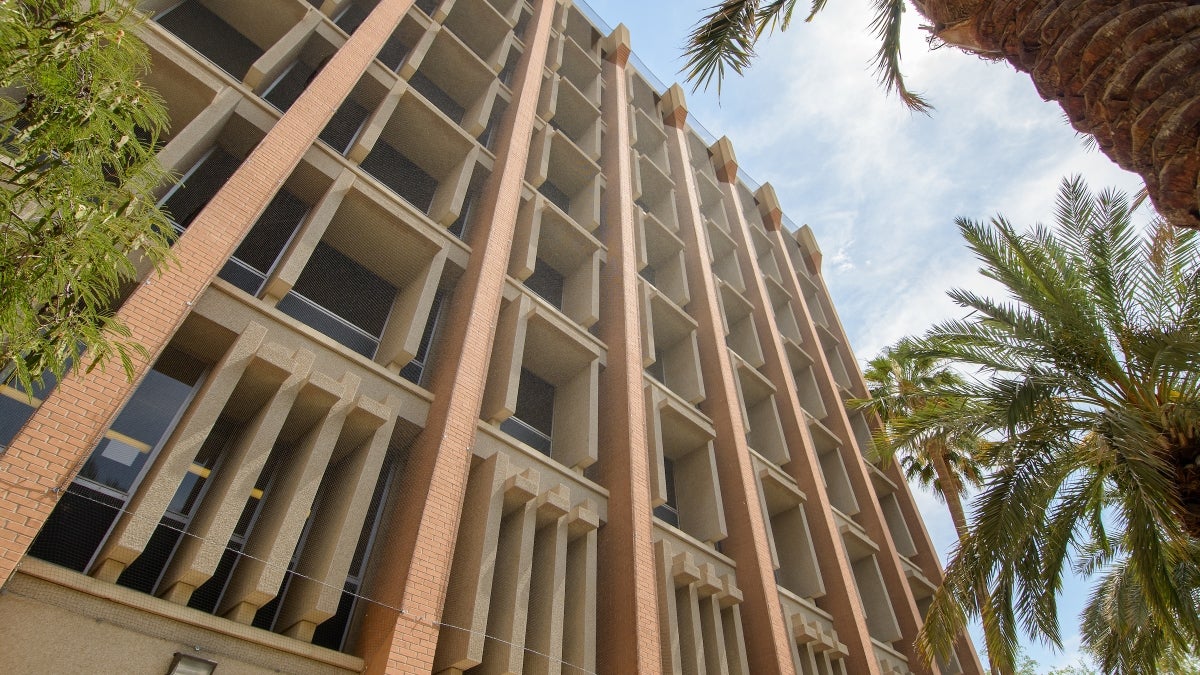Editor’s note: This is part of a series of profiles for spring 2017 commencement. See more graduates here.
It’s no secret that women are underrepresented in the sciences, especially in mathematics. Some researchers believe one factor that contributes is what they call the “brilliance effect” — the beliefs that natural brilliance or knack for a subject drives success, rather than hard work or persistence.
These six young women graduating with degrees in mathematics from the School of Mathematical and Statistical Sciences want to help change that perception. They agree that hard work and perseverance is needed to be successful at math, and at life. By putting in the effort and challenging themselves, they discovered a new way of thinking.
Their hard work is paying off. These top math graduates have earned great jobs right out of college, including working in a CalTech brain lab studying decision-making, becoming a life pricing analyst at USAA insurance, working as an analyst with health-care consulting firm Optumas, and teaching mathematics at McClintock High School. Several others will continue their education pursuing doctoral degrees in computer science at Stanford and working toward an advanced degree in pharmacy.
They hope to inspire the next generation of young girls to work hard as they pursue mathematics or whatever subjects they are interested in.
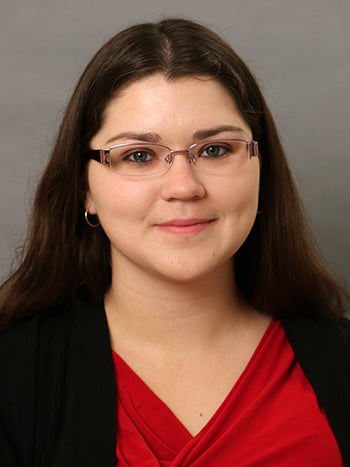
Grace Kennedy
Major: Actuarial Science (School of Mathematical and Statistical Sciences)
Awards and Scholarships earned: New American University Scholar – President's Award, Joaquin Bustoz Memorial Mathematics Scholarship, Blue Cross Blue Shield of Arizona Scholarship, Arizona Power Authority Scholarship, Goldwater Scholarship Honorable Mention
Hometown: Apache Junction, Arizona ("I love the Superstition Mountains. ASU always feels like home too especially because 'A' Mountain is a piece of volcanic rock from the mountain range of my hometown.")
Question: What was your “aha” moment, when you realized you wanted to study math?
Answer: I realized I wanted to "do something" with math in second grade. I viewed math as a means for empowerment, since anyone who was good at math in my elementary school was treated like they were amazing and awesome. I actually didn't focus much on math until this "aha" moment. Luckily for me, that moment occurred early on. I put in a great deal of effort to improve myself because I wanted to be the best at math. When school would go out for summer I was the weird kid who said, "Mom, can we go to the bookstore? I need a math textbook on [insert next math class here]."
Five years later (yep, 12 years old), I found that something. I wanted to be an actuary. I guess I am not the typical kid, but I am passionate about my goals and apparently know how to get there.
Q: What’s something you learned while at ASU — in the classroom or otherwise — that surprised you, that changed your perspective?
A: Like I said in my "aha" moment, I wanted to be the best at math. I needed a change of perspective and I got it my first summer at ASU. I was in the Joaquin Bustoz Math Science Honors Program (JBMSHP) during high school. Basically the JBMSHP is math camp. It was the best thing I could possibly have done with my summers. I made so many friends and a lot of them were better at math than me, but that didn't mean I wasn't amazing and awesome — it meant I could learn from them. I later learned this is called "growth mentality."
Q: Why did you choose ASU?
A: ASU has a wide range of opportunities because it is a large university. Also, the low tuition made higher education accessible to me since I was paying for school on my own. The most significant reason was ASU was going to have an actuarial science program by the time I started my sophomore year. I found out about the program while I was taking a summer class through JBMSHP.
Q: What’s the best piece of advice you’d give to those still in school?
A: Find your passion, pursue it like a goal and tell the world. For instance, I was/am passionate about math; I made it a goal by focusing in on a career involving math (actuarial science); and I told everyone with my actions and my words. People helped me get where I am because I told them what I wanted. I honestly believe people want to help, but you need to help them help you and that can be as simple as telling them what you need help with. I also am passionate about animal welfare; I made it a goal by learning to be a service and therapy dog trainer; and I make it a point to show people the importance of the cause.
It is important to also be willing to try other things because those experiences shape you. While I knew I wanted to be an actuary, I was also involved in the Naval Junior Reserve Officer Training Corp (NJROTC) at my high school. I was dedicated and became commanding officer. Even though I knew I wasn't the right fit for military life, I wanted to help the people that were going to be protecting us. That drive to help military personnel helped me to find work at USAA upon graduation as a life pricing actuary.
Q: Why is math a great major to pursue?
A: Math is a great major because math is awesome and amazing and so are the people who study it. Also, mathematics isn't like a lot of other majors. Math is a tool and can help any degree program by applying the knowledge gained to it. I am not just saying applied math is all math since pure math is where new thought processes develop.
Q: What was your favorite spot on campus, whether for studying, meeting friends or just thinking about life?
A: Noble library really early in the morning (opens at 7 a.m.) is the best place to study since no one is there even during finals week. Once it hits 10 a.m. Noble gets a little noisy, so I like to take a break and go to the lawn near the University Club, Old Main and Language & Literature buildings. It is nice there because the sprinklers have been off just long enough that you can sit in the grass, it is just far enough away from the street that the vehicle noise isn't obtrusive, and from being at the library for the last three hours all your technology is charged.
Q: What are your plans after graduation?
A: I am going to move to San Antonio, Texas, with my fiancé to pursue a career at USAA as a life pricing analyst.
Q: If someone gave you $40 million to solve one problem on our planet, what would you tackle?
A: I have so many causes I would like to help, such as food and clean water insecurity for children, rainforest depletion, veteran affairs for PTSD patients, and math education. I would use the $40 million to raise awareness and recruit investors so I can raise money for all of these causes. ... I guess I live by the "aim for the stars and you'll at least make it to the moon" mentality.
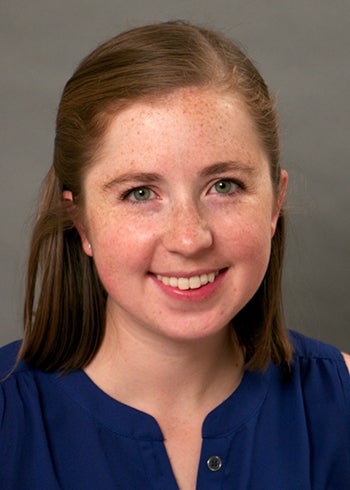
Alexandra Porter
Majors: BS Mathematics (School of Mathematical and Statistical Sciences), BS Computer Science (School of Computing, Informatics, and Decision Systems Engineering)
Minor: Music Performance (Percussion)
Awards: Charles Wexler Mathematics Prize, Computing Research Association Outstanding Undergraduate Researcher Finalist, National Science Foundation Graduate Research Fellowship
Hometown: Albuquerque, New Mexico
Q: What was your “aha” moment, when you realized you wanted to study math?
A: When I started research in theoretical computer science during sophomore year of college, I realized my interest in math was as strong as my interest in CS and I wanted it to be bigger part of my education.
Q: What’s something you learned while at ASU — in the classroom or otherwise — that surprised you, that changed your perspective?
A: Taking Intro to Theoretical Computer Science made me realize that CS can be more than programming.
Q: Why did you choose ASU?
A: I chose ASU based on Barrett, the quality of the CS department, and the overall variety of opportunities at such a big school.
Q: What’s the best piece of advice you’d give to those still in school?
A: Explore new topics in your major or otherwise; you may find something else you want to study that connects to your current interests.
Q: Why is math a great major to pursue?
A: As a major, math has something for every interest, whether in pure theory or applied subjects.
Q: What was your favorite spot on campus, whether for studying, meeting friends or just thinking about life?
A: The music building, for practicing, seeing performances and studying in the courtyard.
Q: What are your plans after graduation?
A: Attend Stanford for PhD in Computer Science.
Q: If someone gave you $40 million to solve one problem on our planet, what would you tackle?
A: I would tackle creating renewable energy.
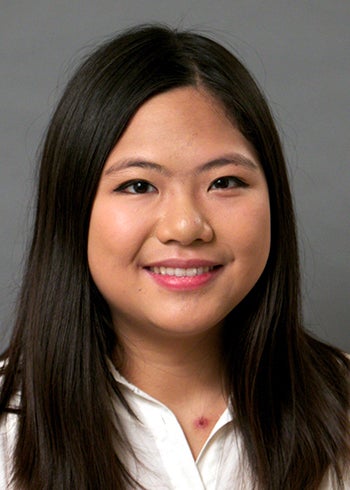
Koranis Sandy Tanwisuth
Majors: BS Mathematics with concentration in Statistics (School of Mathematical and Statistical Sciences), BS Psychology (Department of Psychology)
Certificate: Symbolic, Cognitive and Linguistic Systems
Awards and scholarships earned: André Levard Mackey Scholarship, Jerry Wistosky Memorial Scholarship
Hometown: Bangkok, Thailand
Q: What was your “aha” moment, when you realized you wanted to study math?
A: Since I started participating in several research laboratories, I knew that I need advanced mathematical knowledge to truly understand decision-making process and that’s why I chose to pursue a math degree.
Q: What’s something you learned while at ASU — in the classroom or otherwise — that surprised you, that changed your perspective?
A: Throughout my four years here at ASU, I’ve learned several things and the wisdoms I gained gradually changed my perspective on life. One of the most important changes I notice is that I became a hard worker and a believer in hard-working since it will eventually pay off.
Q: Why did you choose ASU?
A: One of the many reasons I chose to attend ASU is because of the wide range of research opportunities. Since young, I have had a passion toward doing a research in decision making. This will allow me to understand how we as a human make decisions and how can we utilize artificial intelligences to aid our decision-making processes.
Q: What’s the best piece of advice you’d give to those still in school?
A: Work hard! It will pay off.
Q: Why is math a great major to pursue?
A: Personally, the knowledge in mathematics enables me to understand previous literature in the fields and allows me to come up with an idea of new cognitive model. Advanced knowledge in mathematics plays a very crucial role in understanding several phenomena.
Q: What was your favorite spot on campus, whether for studying, meeting friends or just thinking about life?
A: For studying, I liked to go to my lab space at Decision Neuroscience Lab, College Avenue Commons and the Math Community Center in the Wexler math building. For hanging out, I loved to go to Starbucks MU, Secret Garden and Barrett Lounge.
Q: What are your plans after graduation?
A: Starting this summer, I will be working at O’Doherty’s Lab, California Institute of Technology. During this year, I will apply to PhD programs related to Computational Neuroscience/ Statistical Machine Learning and/or related fields to pursue a research career.
Q: If someone gave you $40 million to solve one problem on our planet, what would you tackle?
A: Probably education, since solving this problem will lead to solving several other problems.
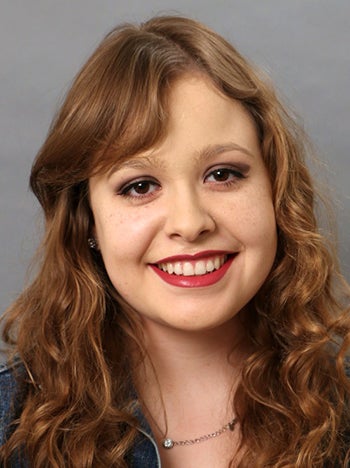
Taylor Patten
Major: BS Mathematics (School of Mathematical and Statistical Sciences)
Awards and scholarships earned: New American Scholar, ASU Moeur Recipient
Hometown: Phoenix
Q: What was your “aha” moment, when you realized you wanted to study math?
A: I realized I wanted to study math sometime in high school. It was the only class that I always enjoyed going to.
Q: What’s something you learned while at ASU — in the classroom or otherwise — that surprised you, that changed your perspective?
A: I’ve learned that I should have more confidence in myself academically. Just because you feel like you aren’t very good at a certain subject doesn’t mean you won’t surprise yourself.
Q: Why did you choose ASU?
A: People come from all over the world to attend ASU; I was lucky enough to be a native Arizonan.
Q: What’s the best piece of advice you’d give to those still in school?
A: My advice to anyone still in school is to continue to pursue your goals, no matter what problems or difficulties you encounter along the way. The right to pursue an education is truly a right to be valued and honored.
Q: Why is math a great major to pursue?
A: Math is a crucial element in so many areas that are vital to our society. For me, it has always been something that I have found challenging and enjoyable.
Q: What was your favorite spot on campus, whether for studying, meeting friends or just thinking about life?
A: My favorite spot on campus was the lower level of the Memorial Union. I’ve spent countless hours in there studying and laughing with my friends.
Q: What are your plans after graduation?
A: I’m continuing my education at ASU in order to complete the prerequisites necessary to pass the PCAT as well as satisfy the requirements necessary for entrance into a three-year accelerated program to become a Doctor of Pharmacy.
Q: If someone gave you $40 million to solve one problem on our planet, what would you tackle?
A: I would love to help find a cure for cancer or spread awareness about global warming.
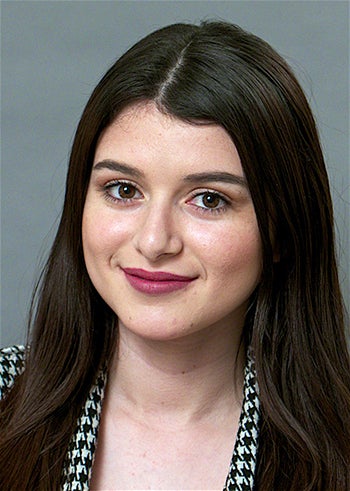
Karla Gonzalez
Major: BS Mathematics with concentration in Secondary Education (School of Mathematical and Statistical Sciences)
Awards and scholarships earned: Ioana Elise Hociota!!! Memorial Mathematics Scholarship, Charles & Christine Michael Scholarship, and New American University Scholarship
Hometown: Tempe
Q: What was your “aha” moment, when you realized you wanted to study math?
A: I decided I wanted to be a math major when I was in high school and stayed after school one of the days with my math teacher, and she showed me how to prove a mathematical concept and I was just in awe. I wanted to do these discoveries more and more.
Q: What’s something you learned while at ASU — in the classroom or otherwise — that surprised you, that changed your perspective?
A: I always thought math was about getting an "answer," but it is much more than that; it is a way of thinking and problem solving.
Q: Why did you choose ASU?
A: I chose ASU because I knew there would be a large community of people that I could connect with and share my ideas with who would be more than willing to help me grow.
Q: What’s the best piece of advice you’d give to those still in school?
A: I would tell those still in school to stay focused and positive because even though things get overwhelming life is about learning and growing and you will learn so much about yourself while in school.
Q: Why is math a great major to pursue?
A: Math is in everything. Math is a way of thinking. If you truly want to exercise your brain and be able to think in a new way, majoring in math is the way to go.
Q: What was your favorite spot on campus, whether for studying, meeting friends or just thinking about life?
A: I loved the breezeway in the Wexler math building, as well as Hayden. Those were my sanctuaries.
Q: What are your plans after graduation?
A: I have currently been hired to teach math at the high school level at McClintock High School in Tempe.
Q: If someone gave you $40 million to solve one problem on our planet, what would you tackle?
A: I would tackle starvation. No one deserves to die of hunger and malnutrition.
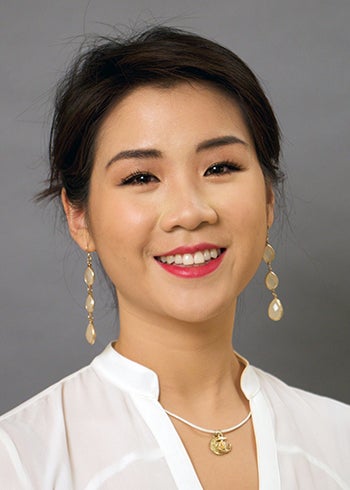
Julie Tang
Major: Actuarial Science (School of Mathematical and Statistical Sciences)
Awards and scholarships earned: National Merit Scholar, New American Scholar
Hometown: Chandler, Arizona
Q: What was your “aha” moment, when you realized you wanted to study math?
A: I was good at math, enjoyed math and finally understood by sophomore year that my greatest utilitarian value in society would be maximizing my efficiency and finding something in math.
Q: What’s something you learned while at ASU — in the classroom or otherwise — that surprised you, that changed your perspective?
A: The hardest thing to learn is the emotional labor it takes to make and maintain friendships.
Q: Why did you choose ASU?
A: Scholarships made ASU free, and I was not self-confident enough as a little senior in high school to go to Berkeley all on my own.
Q: What’s the best piece of advice you’d give to those still in school?
A: Finding (making, working for) a supportive system of friends might save your grades or your life!
Q: Why is math a great major to pursue?
A: With some reductionist reasoning, every STEM major is built on math. If you are a master of math, you can easily apply it to many fields.
Q: What was your favorite spot on campus, whether for studying, meeting friends or just thinking about life?
A: Noble Library, where I am typing this now. The study rooms are very nice and accessible.
Q: What are your plans after graduation?
A: I'm going to Sweden and Iceland for two weeks with my older sister! Then I am starting my job at Optumas, a small health-care consulting firm in Scottsdale.
Q: If someone gave you $40 million to solve one problem on our planet, what would you tackle?
A: The most frustrating issue I feel is the aggressive, willful ignorance or confirmation bias that plagues all of humanity. I feel there's not a single problem existing today that could not be solved by elevated rationality and consciousness of all humans. I honestly can't think of a single problem that plagues all of humanity that can be dented by just $40 million. I guess I'll give it to independent cancer research.
Top photo: Wexler Hall on the Tempe campus is home to the School of Mathematical and Statistical Sciences.
More Science and technology

Ancient sea creatures offer fresh insights into cancer
Sponges are among the oldest animals on Earth, dating back at least 600 million years. Comprising thousands of species, some with lifespans of up to 10,000 years, they are a biological enigma.…

When is a tomato more than a tomato? Crow guides class to a wider view of technology
How is a tomato a type of technology?Arizona State University President Michael Crow stood in front of a classroom full of students, holding up a tomato.“This object does not exist in nature,” he…

Student exploring how AI can assist people with vision loss
Partial vision loss can make life challenging for more than 6 million Americans. People with visual disabilities that can’t be remedied with glasses or contacts can sometimes struggle to safely…
